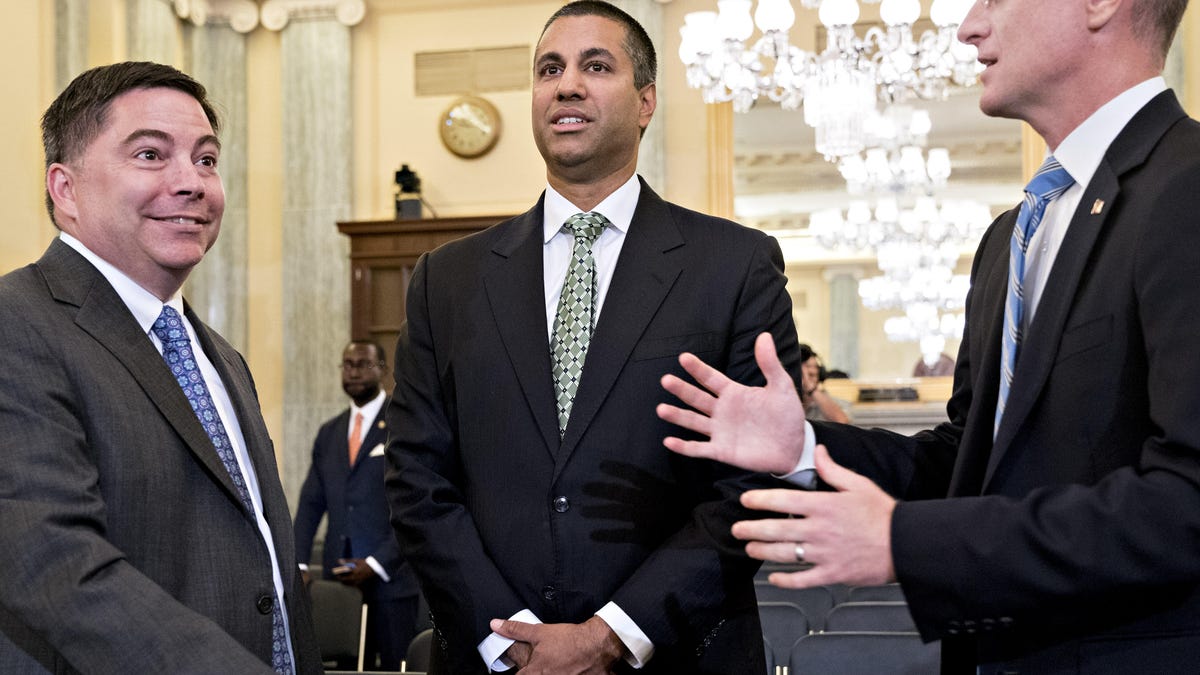Republican-controlled FCC doubles down on net neutrality repeal
In a 3-2 vote, Republicans on the FCC say they won't change a thing in their 2017 repeal of Obama-era net neutrality protections.

(From left) FCC Commissioner Michael O'Rielly, Chairman Ajit Pai and Commissioner Brendan Carr.
Republicans on the Federal Communications Commission reaffirmed the agency's 2017 repeal of Obama-era net neutrality rules in a 3-2 vote Tuesday. The vote came in response to a federal court's order a year ago that directed the agency to review some provisions of the repeal. The two Democrats on the FCC dissented.
The net neutrality rules, which were passed under President Barack Obama's administration in 2015, barred internet service providers from blocking or slowing internet content. They also banned these providers from allowing online companies to pay for "fast lanes" that would deliver their content to users more quickly.
In 2017 under President Donald Trump, the FCC repealed the rules and abdicated some of its regulatory authority over broadband companies.
A federal appeals court in October 2019 upheld most of the FCC's repeal of the rules. But it also ordered the agency to reconsider its repeal based on how the move might affect public safety, regulations on infrastructure attachments to utility poles, and the FCC's ability to provide subsidies to low-income individuals for broadband service.
The three Republicans making up the FCC's majority voted Tuesday to leave the order unchanged. Chairman Ajit Pai said in a blog post ahead of Tuesday's vote that after reviewing public comment on the issues, he's "confident that the regulatory framework we set forth in the Restoring Internet Freedom Order appropriately and adequately addresses each issue."
Pai and other Republicans have argued that since the repeal of net neutrality rules went into effect in June 2018 consumers' access to the internet hasn't changed. They credit the agency's deregulation for spurring investment in network infrastructure, which allowed broadband and wireless networks to be ready for the onslaught of traffic they faced as the coronavirus forced millions of people across the country to work and attend school from home via internet connections.
But consumer groups and critics of the FCC's repeal dispute this assertion. They also still fear that broadband companies will raise prices, stifle online competition and selectively control the speed of access to certain content.
"It is patently obvious to all but the most devoted members of the net neutrality cult that the case against the (net neutrality repeal) was a sham," Pai said in his statement Tuesday.
The two Democrats on the FCC, commissioners Jessica Rosenworcel and Geoffrey Starks, voted against the FCC's order to uphold the 2017 repeal of the rules without addressing the court's concerns. They argued in their dissenting comments that the FCC majority didn't provide enough justification to leave the repeal unchanged.
"This agency is not interested in getting it right," Rosenworcel said. "Instead, it doubles down, rather than recognizing the realities of the world around us."
Starks said he doubts that the FCC's response to the court's remand will satisfy judges on the US Court of Appeals for the District of Columbia Circuit if the FCC is sued again over these issues.
Sen. Ed Markey, a Democrat from Massachusetts, said "without net neutrality protections, it's just a matter of time before big broadband providers start raising prices, slowing down internet speeds, and making it harder for families, small business, and students to access the opportunities to recover and rebuild from this pandemic."
Markey vowed to continue to fight for net neutrality.
"The FCC's vote today to double down on repealing net neutrality and ignore its impact on public safety, universal access, and broadband competition continues to fly in the face of the reality that Americans confront today -- the urgent need for access to reliable and affordable broadband free of corporate control," Markey said in a statement.
Democrats have made reinstating net neutrality rules a campaign issue. Presidential candidate and former Vice President Joe Biden is expected if he wins to appoint an FCC chairman who would reinstate the Obama net neutrality rules. And if Democrats win both the House of Representatives and the Senate, they may also pass legislation that would codify net neutrality protections into law, ensuring that the ping-pong court battles over the issue cease.

